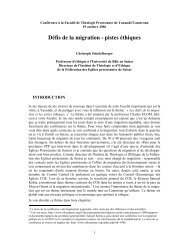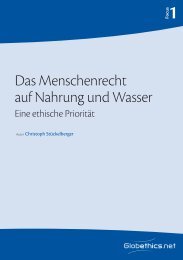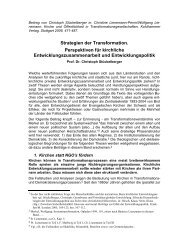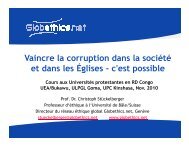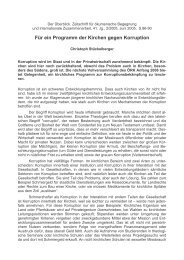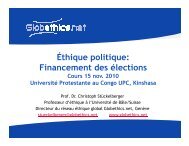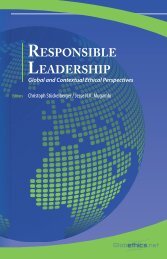BREAK THE CHAINS OF OPPRESION AND THE YOKE OF ...
BREAK THE CHAINS OF OPPRESION AND THE YOKE OF ...
BREAK THE CHAINS OF OPPRESION AND THE YOKE OF ...
Create successful ePaper yourself
Turn your PDF publications into a flip-book with our unique Google optimized e-Paper software.
Ethics evasion as a form of passive resistance is, in this context, unethical. Punitive<br />
tax justice needs equal treatment of tax payers, which in turn needs<br />
court systems which are not corrupt. Corruption is cancer which undermines<br />
punitive tax justice.<br />
12. The Principle of Restoration: Tax amnesty is a means for states to recover<br />
part of the tax evasion. It contradicts the principle of fair punishment but<br />
is often legitimized by the governments’ need for additional income and<br />
can be seen as an attempt for (at least partial) restorative justice. The goal<br />
then justifies the means. In the conflict of interests between punitive tax<br />
justice and distributive tax justice, tax amnesty is not in any case to be ethically<br />
condemned, but to a greater extent depends on the conditions,<br />
forms and frequency of tax amnesty.<br />
13. The Principle of Transformation: The perception of tax justice evolves as all<br />
value systems do. It can then happen that an activity such as tax evasion or<br />
black money transfer is more or less accepted and then, by international<br />
developments such as in the OECD countries, is seen as a heavily illegal<br />
crime. Thus, a grey zone of insecurity about what is just or unjust is<br />
opened. In such situations, for reasons of procedural justice, it is often<br />
necessary to define and allow a transition period for transitional justice<br />
which can lead to transformative justice with a new level of international<br />
tax justice.<br />
Tax Justice also with Developing and Emerging Countries<br />
The above principles first of all have to be applied within sovereign states which<br />
have the power and authority for tax collection. But they also have to be applied<br />
between sovereign states. In a globalized world, the states are not isolated but interdependent<br />
in manifold ways. Therefore, tax justice is an intergovernmental,<br />
regional and global topic. It is a hot issue because tax evasion is still growing<br />
within the liberalized financial markets. The efforts to decrease tax evasion are,<br />
since the 2007/2008 global financial crisis, strongly increased because states urgently<br />
need more tax income to cover their financial engagement to overcome<br />
the crisis.<br />
Every state has the right to tax its taxable population in order to provide services<br />
to this population and the global community. This is the first principle of tax<br />
justice. It includes the ethical obligation of states to support each other in tax<br />
collection by not protecting tax evasion. 14 � � � � �<br />
The principle is based on the universally<br />
accepted ethical Golden Rule of reciprocity, whereby we should do and give<br />
14 The following is based on the article Stückelberger, Christoph, Weissgeld-Strategie<br />
kann unseren Finanzplatz stärken. Die Schweiz sollte über Europa hinausblicken,<br />
Neue Zürcher Zeitung am Sonntag, 21 February 2010, Hintergrund.<br />
��������������������������������������������<br />
� � � � ������������������� �<br />
– CLIMATE JUSTICE <strong>AND</strong> TAX JUSTICE – 93



